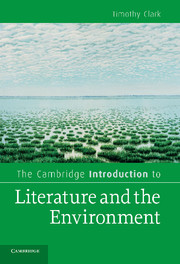Book contents
- Frontmatter
- Contents
- List of illustrations
- Preface
- Acknowledgements
- Introduction
- Romantic and anti-romantic
- The boundaries of the political
- Chapter 7 Thinking like a mountain?
- Chapter 8 Environmental justice and the move ‘beyond nature writing’
- Chapter 9 Two readings
- Chapter 10 Liberalism and green moralism
- Chapter 11 Ecofeminism
- Chapter 12 ‘Post-colonial’ ecojustice
- Chapter 13 Questions of scale
- Science and the struggle for intellectual authority
- The animal mirror
- Notes
- Further reading
- Index
- Cambridge Introductions to …
Chapter 9 - Two readings
European ecojustice
Published online by Cambridge University Press: 05 June 2012
- Frontmatter
- Contents
- List of illustrations
- Preface
- Acknowledgements
- Introduction
- Romantic and anti-romantic
- The boundaries of the political
- Chapter 7 Thinking like a mountain?
- Chapter 8 Environmental justice and the move ‘beyond nature writing’
- Chapter 9 Two readings
- Chapter 10 Liberalism and green moralism
- Chapter 11 Ecofeminism
- Chapter 12 ‘Post-colonial’ ecojustice
- Chapter 13 Questions of scale
- Science and the struggle for intellectual authority
- The animal mirror
- Notes
- Further reading
- Index
- Cambridge Introductions to …
Summary
In Europe a sustained concern with protecting the environment has often been associated with a simplistically conservative or sometimes nationalist politics, defending some place or way of life as an icon of a cultural identity or as an image of once traditional ways of life. ‘Green’ critics have accordingly also felt a need to highlight issues of justice in terms of the politics of nostalgia. Comparison between two recent arguments, one on an English novelist and one on a German novelist of the 1880s, shows a striking convergence of concerns.
Wilhelm Raabe's Pfister's Mill (1884) has been called Germany's first ‘eco-novel’. Its basic story is simple enough, that of an honest miller and later tavern keeper who is forced out of business by the effluent from a nearby sugar beet refinery. This first clogs up the mill-stream and later ruins the mill's second life as a picturesque tavern because of its pervasive stink. The miller fights a court case against the refinery, aided by the figure of Adam Asche, a chemist and tutor of the miller's son Ebert. The case is won, but the business is doomed anyway. Ironically, Asche later uses his scientific expertise to run a dry-cleaning business in Berlin, which also pollutes its local river. The main story is told in retrospect by Ebert, now a teacher and an inhabitant of Berlin, who has chosen to spend a summer holiday with his young wife at the mill, shortly before it is to be demolished and the land further developed.
- Type
- Chapter
- Information
- The Cambridge Introduction to Literature and the Environment , pp. 96 - 101Publisher: Cambridge University PressPrint publication year: 2011

